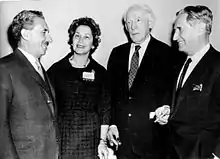Louis Lipsky
Louis Lipsky (November 30, 1876 – May 27, 1963) was an American Zionist leader, President of the Zionist Organization of America, magazine editor, and author of books on Jewish culture and politics.

Biography
Louis Lipsky had three sons: David Lipsky, a theatrical press agent, Eleazar Lipsky, a novelist, and Joel Carmichael, a historian. His grandson is Richard Lipsky, a lobbyist and author of the seminal book on politics and sports: How We play the Game (Beacon Press); great-granddaughter is the filmmaker Emily Carmichael.[1] His sister, Lena, married economist and congressman Meyer Jacobstein.[2][3] Lipsky has constantly called attention to the plight of European Jewry at Nazi Germany requesting to organize their rescue.[4][5][6] Already in 1931, Lipsky warned of menace to Jews if Hitler wins. As he's representing the "darkest forces of rampant chauvinism."[7]
Journalism career
Lipsky began his career as a reporter in Rochester, NY eventually moving to New York City where he joined the staff of the New York Morning Telegraph as a reporter covering theater news and serving as a drama critic.[8] Lipsky was the editor of the magazine, The American Hebrew, from 1900 to 1914 and periodicaly the editor of The Maccabean-magazine (later became The New Palestine (magazine)).[4]
Zionist activism
He left the magazine to become secretary of the Federation of American Zionists, the organization that would become the ZOA, and in that capacity edited the first Zionist publication in English, The Maccabean. He was Chairman of the ZOA from 1922 to 1930 and served as its President from 1926 to 1930.[9] The ascension of Lipsky to Chairman and President of the ZOA was part of a power struggle against the leadership of Louis Brandeis over issues of structural organization and financial planning and came about in part due to the influence and support of Chaim Weizmann who preferred Lipsky's candidacy.[10] The "Lipsky" and "Brandeis" factions of Zionism were reconciled in 1930 when an eighteen member administrative council, split equally between their respective supporters, was elected to govern the ZOA.[11]
Lipsky's first collection of essays on Zionism was published in 1927 as The Selected Works of Louis Lipsky and reprinted in 1977 as Thirty Years of American Zionism. He also published Gallery of Zionist Profiles (1956), an early history of the Zionist Movement told through profiles of its leaders and thinkers, and Tales of the Yiddish Rialto: Reminiscences of Playwrights and Players in New York's Jewish Theatre (1962).[9]
See also
References
- "Joel Carmichael: Obituary" (February 12, 2006). The New York Times. Retrieved November 26, 2013.
- "December 14, 1928 - Image 1". The Detroit Jewish News Digital Archives. Retrieved 2021-01-21. "Congressman Meyer Jacobstein to Speak..." ... Brother-in-Law of Louis Lipsky.
- Glassman, Leo M. (1935). Biographical Encyclopaedia of American Jews, 1935. Maurice Jacobs & Leo Glassman. p. 250.
- Eisenberg, Ronald L. (2006). The Streets of Jerusalem: Who, What, why. Devora Publishing. p. 235. ISBN 978-1-932687-54-5.
- Gutman, Israel (1990). Encyclopedia of the Holocaust. Macmillan Library Reference USA. p. 595. ISBN 978-0-02-864527-8.
- "Search Results". www.ushmm.org. Retrieved 2021-01-21.
- "A MENACE TO JEWS SEEN IF HITLER WINS; Lipsky, Zionist Leader, Warns Maccabeans of Peril Looming in Germany.LEHMAN ADVISES YOUTHS Urges Adherence to Ideals That Prompted Forefathers to Come to This Country. Lehman Pleads for Jewish Ideals. Historic Continuity Cited. (Published 1931)". The New York Times. 1931-12-13. ISSN 0362-4331. Retrieved 2021-01-21.
- "Louis Lipsky, Dean of American Zionist Movement, Dead" (May 28, 1963). Jewish Telegraphic Agency. Retrieved November 26, 2013.
- Sandberg, Louis (November 2001). "A Guide to the Papers of Louis Lipsky (1876-1963), Undated, 1898-1976". American Jewish Historical Society. Retrieved November 26, 2013.
- Segev, Zohar. "Between Jerusalem and Tel Aviv: The Place of Jerusalem in the 'Weltanschauung' of Three American Zionist Leaders". Israel Studies Forum Vol. 22, No. 2 (Winter 2007). Retrieved December 1, 2013.
- "Religion: Zionist Chiefs" (July 28, 1930). Time Magazine. Retrieved December 1, 2013.
Further reading
- Deborah Lipstadt, The Zionist Career of Louis Lipsky, 1900-1921. Arno Press, Series Dissertations in American Biography, New York 1982, ISBN 9780405140860